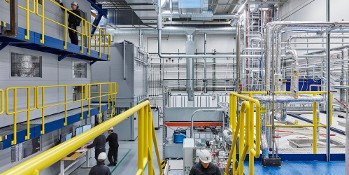Braskem, the petrochemical company in the Americas and the production of biopolymers, and Haldor Topsoe, the supplier of catalysts, technology, and services for the chemical and refining industries, have announced that they achieved their first-ever demo-scale production of bio-based monoethylene glycol (MEG). As a result of the collaboration between the two companies, the MOSAIK™ technology development has been progressing according to schedule at the demonstration unit located in Lyngby, Denmark.
The demonstration unit was started up in 2019 with the primary goal to demonstrate all key design features of the pioneering technology that transforms sugar into renewable MEG. Since then, the remaining process units of the plant have been built and put into operation, and the production process has been optimized.
MEG is a raw material for PET (polyethylene terephthalate), which has numerous applications and is an essential feedstock in sectors such as textiles and packaging, especially beverage bottles. Currently, MEG is predominantly made from fossil-based feedstocks, such as naphtha, gas, or coal. The global MEG market represents a value of approximately USD 25bn.
The technology will also co-produce, in a lower quantity, monopropylene glycol (MPG), which has a wide variety of applications ranging from unsaturated polyester resins (UPR), commonly used in construction materials, to cosmetic products.
The next phase will involve providing samples to strategic partners for testing and validation. The results of the demonstration plant operations and the validation of products will be essential for the decision to deploy the technology on a commercial scale.


